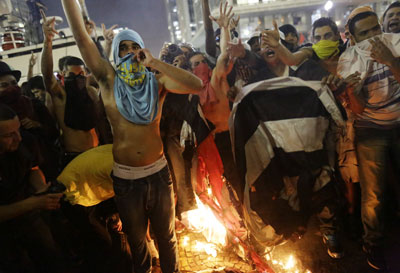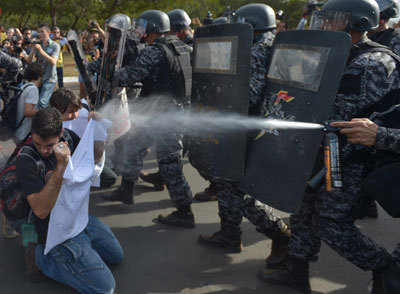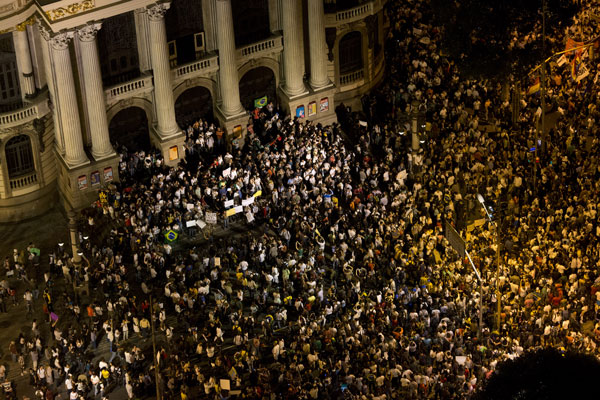Brazil: "The Giant Woke Up"
June 30, 2013 | Revolution Newspaper | revcom.us
Starting with smaller protests against public transportation fare hikes in late June, the South American nation of Brazil rapidly became convulsed with massive, righteous protest. The upheaval is shaking Brazil on a scale and with intensity not seen in decades. More than a million protesters marched in the streets on June 20 in 100 cities throughout Brazil.
Brazil is a huge country of nearly 200 million people, touted as a model of "democratic" (that is–capitalist) development. The protests came seemingly out of nowhere, but more profoundly are a product of deep-seated outrages in every corner of Brazilian society.
People are outraged that tens of billions are being spent on luxurious venues and stadiums for the 2014 World Cup [soccer] and the 2016 Summer Olympics when there is a desperate need for schools, medical care, and basic services. A 26-year-old business student in the protests carried a sign that read, in English, "We won't have World Cup because the giant woke up."
A young tech support assistant in Rio de Janeiro told the New York Times, "They don't invest in education, they don't invest in infrastructure, and they keep putting makeup on the city to show to the world that we can host the World Cup and Olympics... We work four months of the year just to pay taxes and we get nothing in return."

Protestors burn a Sao Paulo state flag in front of City Hall, in Sao Paulo, June 18, 2013. Photo: AP
People are protesting, and for now have forced rollbacks in many cities' increases in public transportation prices. Protesters are denouncing the endemic corruption among those in power, protesting onerous taxes and poor schools. And they are targeting mainstream media outlets while setting up alternative information distribution channels.
Another ongoing front of struggle has been resisting the eviction of some 170,000 residents of Brazil's infamous favelas (shantytowns) to make way for Olympic venues, and to present a whitewashed picture of the country to tourists.
And Brazil's "development" has led to the deforestation of huge sections of the Amazon rainforest, and a ferocious assault on the land, rights, and lives of indigenous peoples.

Above: in Brasília, the capital city of Brazil, police shot pepper spray and tear gas to stop protesters from reaching Congress. In Rio de Janeiro, the police attacked protesters with tear gas and rubber bullets. Dozens were reported injured. Photo: AP
As has been the case whenever people challenge the interests and agenda of capitalism-imperialism, the state institutions that serve that system have responded with violence in cities around the country. In Brasília, the capital city, police shot pepper spray and tear gas to stop protesters from reaching Congress. In Rio de Janeiro, the police attacked protesters with tear gas and rubber bullets. Dozens were reported injured.
* * * * *
(For background on the emergence of Brazil as a global economic and political force, see "Shifts and Faultlines in the World Economy and Great Power Rivalry: What Is Happening and What It Might Mean" by Raymond Lotta at revcom.us).
If you like this article, subscribe, donate to and sustain Revolution newspaper.

